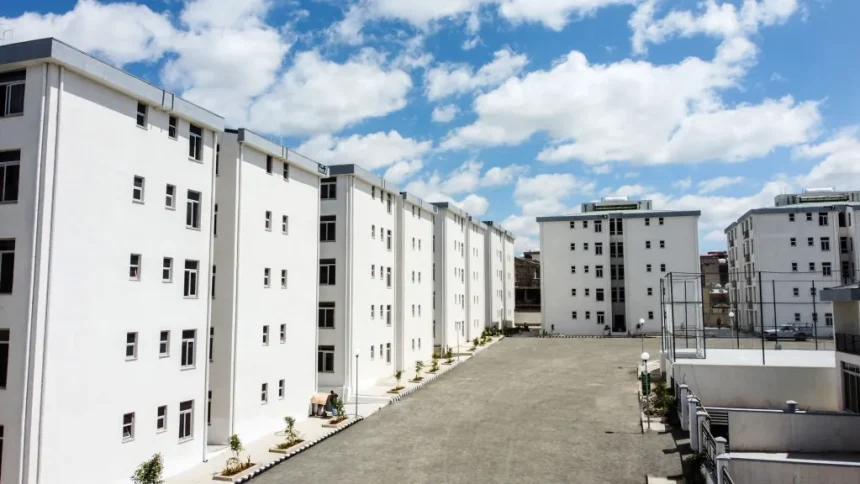Once a thriving hub for real estate development, Addis Ababa’s housing market is now grappling with a growing crisis. Developers who once raced to meet the seemingly endless demand for high-end apartments are now facing unsold units and growing inventories of luxury properties.
Despite a surge in property prices over the past few years, the market has slowed significantly, leaving many to question the future of real estate in Ethiopia’s capital.
As of early 2025, the average price of a home in Addis Ababa stands at a staggering 15.92 million Ethiopian Birr (ETB), according to the Ethiopian Property Centre.
The cost per square meter is reported to be around $1,680—a figure that has tripled in just two years. Residential property prices vary widely: the most expensive homes are listed at 35 million Birr, while more affordable options start as low as 230,000 Birr. According to Statista, Ethiopia’s real estate market is expected to reach a value of US$1.33 trillion by 2025.
Among the segments, residential real estate holds the largest share, projected to reach US$1.15 trillion in market volume. The market is anticipated to grow at an annual rate of 6.20% from 2025 to 2029, reaching US$1.69 trillion by 2029.

While these projections suggest optimism, a significant downturn is already sweeping through the sector.
The once-vibrant real estate market in the capital is beginning to show signs of strain. The surge in property prices, which had seemed unstoppable just a year ago, has now met with stagnation.
High-end apartments and luxury villas have flooded the market, but demand for these premium properties has fallen sharply.
Developers who previously raced to meet an insatiable appetite for new housing now face prolonged sales cycles and increasing inventories of unsold units.
This slowdown has forced developers to slash prices in a desperate attempt to attract buyers. While year-on-year sales may show an apparent uptick, developers caution that this is not a sign of recovery—but rather the result of steep price cuts made to stay afloat.
Several factors contribute to this market contraction and must be understood in the context of broader economic challenges. First, inflationary pressures have severely eroded the purchasing power of households.
With rising consumer prices across various sectors, housing affordability has become a major issue—particularly for middle- and lower-income groups.
For many, the dream of owning property is increasingly out of reach. Meanwhile, developers continue to push forward with luxury developments, even as demand for such properties weakens, resulting in a glut of high-value, unsold inventory. This problem is further compounded by tighter credit conditions, making it more difficult for individuals to secure loans for property purchases.
Regulatory uncertainty and recent policy shifts also play a significant role. Real estate developers and investors thrive on stability.
Any disruption or ambiguity in the legal or financial landscape creates hesitation. Sudden regulatory changes have fueled uncertainty, making it difficult for buyers and developers to plan with confidence.
Without consistent and transparent policies, investments in high-end properties are seen as risky, and speculative investment is already beginning to lose its appeal.
Traditional financing models—relying heavily on large down payments and prepayments—are also becoming unsustainable.
These structures are increasingly out of reach for many prospective buyers, especially with rising interest rates and the National Bank of Ethiopia’s credit cap.
As a result, both buyers and developers are being forced to rethink their financial strategies. The construction sector’s overreliance on speculative investment and luxury housing has also failed to meet the real demand, which lies in more affordable housing solutions.
The effects of the slowdown are already evident in the falling number of property sales. Some developers report that less than a quarter of completed units have been sold, signaling a deepening market crisis. Even newly completed projects remain vacant, contributing to an oversupply of high-end housing in a city where market vibrancy is waning.
As these challenges persist, the focus is slowly shifting. Developers are beginning to explore more affordable housing options to meet the needs of a broader portion of the population. The move from luxury properties to budget-friendly housing may offer a path forward, but a key challenge remains: restoring market confidence and stabilizing demand.
A new complication could worsen the real estate market’s situation. With the recent approval of the Asset Recovery Proclamation, the landscape for future property investment might shift. Although developers may not feel the immediate effects—since most properties have already been sold—the law could erode buyer confidence.
The prospect of asset scrutiny and potential seizure may deter prospective buyers.
This added layer of uncertainty could affect long-term market sentiment, particularly among high-net-worth individuals and foreign investors who have historically driven demand for luxury real estate in Addis Ababa.
With reduced demand, developers may be forced to lower prices even further to attract increasingly risk-averse buyers.
Looking ahead, many banks—including the state-owned Commercial Bank of Ethiopia—have adjusted their loan interest rates. This tightening of credit could pose additional challenges. With higher borrowing costs, buyer hesitation is likely to increase, which may further slow demand, especially at a time when the broader economy is under strain.
If this trend continues, it could deepen the current downturn and hinder any meaningful recovery in the short to medium term. The real estate sector now faces an uphill battle to regain stability, and its future will depend on how effectively it adapts to these mounting financial and economic pressures.



